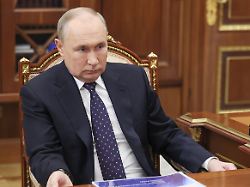Ukrainetalk at Illner
“Putin needs war”
By Marko Schlichting
March 22, 2024, 4:51 a.m
Listen to article
This audio version was artificially generated. More info | Send feedback
At the end of every war there are negotiations at some point – but at the moment neither the aggressor Russia nor the attacked Ukraine show any willingness to do so. Putin has no interest in peace, says former Moscow correspondent Sabine Adler at Maybrit Illner.
Last weekend, Russian President Vladimir Putin was confirmed in office after a sham election. It was already clear that Putin would win the election. At the same time, Ukraine is no longer able to successfully combat Russian dominance. Maybrit Illner on ZDF is concerned with the question of whether the country still has a chance of winning Russia’s war of aggression, which violates international law. The guests agree: it will be difficult.
The former Moscow correspondent for Deutschlandfunk, Sabine Adler, does not want to talk about an election in Russia. That was a pseudo-election, she says at Maybrit Illner. She also refuses to call Putin a president. She says: “He doesn’t deserve this title, you have to think of another one.”
The majority of the Russian people are not behind the war, explains Vladimir Volkov, an employee and friend of the slain opposition politician Navalny. His organization surveys people in Russia every month. In December, 68 percent of those surveyed said the war had to end immediately. Volkov says he still believes in the possibility that Russia can become a democratic state.
The chairwoman of the Sahra Wagenknecht alliance, Amira Mohamed Ali, also says: “The election was not democratic.” Putin is not a president legitimized by the people. “But he is actually in power. And I don’t think we can change that at the moment. And then we have no choice but to talk to him and try to end this war through negotiations if possible will be ended quickly.”
The only problem is: Putin rejected peace negotiations in a television interview last week. She doesn’t know how Putin can still be brought to the negotiating table. But she knows that the arms deliveries of the last two years have achieved nothing.
Sabine Adler explains why this could be the case: “Putin needs war,” she says. “Because he needs it to maintain power.” Because of the war he has an external enemy. This external enemy is rallying the population behind Putin. Adler: “And that’s why he will look for a new theater of war after Ukraine if he is not prevented from doing so. And that is something that not everyone in Europe has yet understood. It won’t be over for Putin with Ukraine either if we “As democratic countries, they don’t really show limits to it. And that means, for example, in Ukraine: Anyone who proposes negotiations for a ceasefire must also negotiate security guarantees, because this ceasefire must be adhered to.”
Klingbeil promises arms deliveries
Adler is alluding to statements made by Amira Mohamed Ali – and to a Bundestag speech by SPD parliamentary group leader Mützenich. Last Thursday he asked his party’s politicians in particular to think about freezing the war in Ukraine followed by peace negotiations. There was strong criticism of this, both from the coalition partners the Greens and FDP, as well as from the CDU and CSU.
SPD leader Lars Klingbeil defends Mützenich’s demands, but admits: There are few signs of negotiations at the moment. He believes that Putin first wants to wait for the results of the elections in the USA. Mützenich also said in his speech that Germany wanted to continue to support Ukraine and strengthen it militarily. “And I think that’s the most important thing now, that it gets artillery ammunition, where we as Europeans have to become much better and faster.” He doesn’t think it’s possible to sit down at the same table with Vladimir Putin. But no one in Germany can make the decision about peace negotiations anyway; that is solely a matter for Ukraine. Mützenich wanted to think about peace in his speech, but support for Ukraine continues, and that also applies to military support.
That also seems necessary. If you listen to “Bild” deputy editor-in-chief Paul Ronzheimer, who was in Ukraine two weeks ago and spoke to soldiers, this becomes completely clear. “The situation at the front is actually dramatic,” he says at Illner. Soldiers told him that the Russians could attack ten times, but they could only defend themselves once. “It is absolutely catastrophic for them. And at the same time we see that after this election, Vladimir Putin announced that he would mobilize sixteen new brigades.” The Ukrainian army has two problems at the moment: the lack of mobilization and the lack of ammunition, says Ronzheimer.
Klingbeil promises improvement on the last point. Although artillery ammunition cannot be produced overnight, “But we have started up the factories.” A breakthrough has been achieved with France and ammunition can also be purchased from third countries; the European Council has made the financing clear for this. “I see that we are currently running into a time gap,” said Klingbeil. “But we are still increasing ammunition capacities in Germany and other European countries.”
